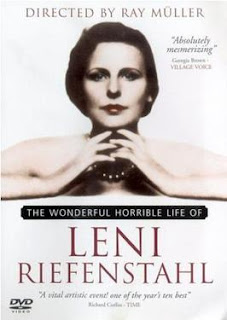Law reVIEW: The Wonderful, Horrible Life of Leni Riefenstahl
Law reVIEW is a blog series dedicated to investigating and reviewing both popular and documentary films in the Chastek Library film collection.
THE WONDERFUL, HORRIBLE LIFE OF LENI RIEFENSTAHL (1993)
Directed by Ray Müller, this documentary does a deep dive into the life of Leni Riefenstahl, the propagandist behind the award-winning documentary, Olympia, and Adolf Hitler’s immensely successful Triumph of the Will.
As a young woman, Riefenstahl began her career in film in front of the camera starring in several successful silent films before moving behind the camera as one of the few women directing during the time of the German Reich. A favorite director of the German leader, Adolf Hitler, Riefenstahl was in close contact with the Führer during the making of several propaganda films that are now considered as having been essential to the carrying out of his Final Solution.
However, throughout the documentary, Riefenstahl maintains her innocence, even in the face of documented proof, that she was not a Nazi sympathizer, and that her interest in creating these films was strictly due to loving the craft of film-making and not the creation of Nazi propaganda.
_____________________________
Describing this almost three-hour documentary is difficult as it paints an image of the director that is sometimes at odds with the historically villainous character that has been ascribed to her throughout her life. This
movie is absolutely fascinating in its complexities and its
overwhelming confusion as to who Leni Riefenstahl really was. Was she a Nazi sympathizer who sought to support the regime through propaganda? Was she innocent, and in fear for her future forced into producing these films for a murderous dictator? Or, was she an artist that looked at the craft of film-making as a challenge and strove to create new and interesting processes for future artists through the films she was allowed to produce? The documentary tackles many of these questions and actually asks the woman herself in face-to-face interviews throughout the film. Her answers are filled with her claims of ignorance - that she was always out of the country and on location filming when the worst of Hitler’s plans were carried out so she could not know; however, there are instances where it just does not make sense, such as her use of Romani concentration camp victims as extras in her film, Lowlands.
After the war, she was arrested and housed for years in a French detention camp for Nazi sympathizers. She was ultimately freed and found to have committed no war crimes during World War II even though her documentaries were essential to the building of Hitler’s power in Germany. It is ultimately up to the viewer to decide what they are willing to believe about the innocence or guilt of this very famous and very infamous director, but there is one thing that is clear. While Leni Riefenstahl was a filmmaker who loved and lived for writing and directing, after the war was lost for Germany, her involvement in the creation of Nazi propaganda ultimately destroyed her career and she was banned from creating another film for the remainder of her very long life.
